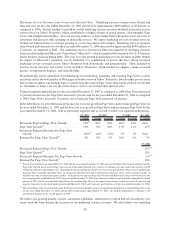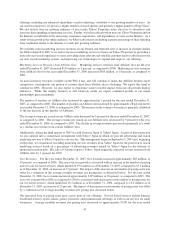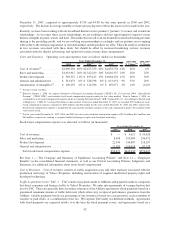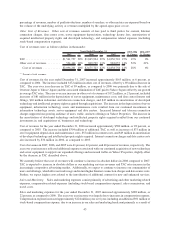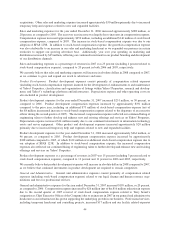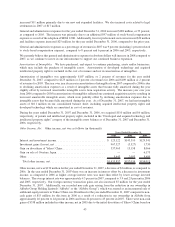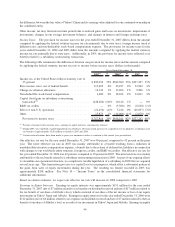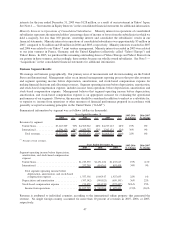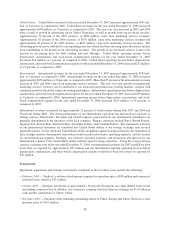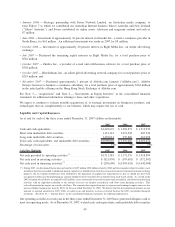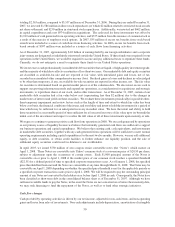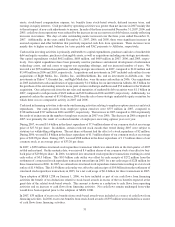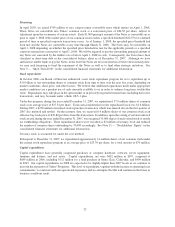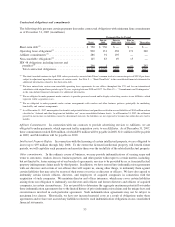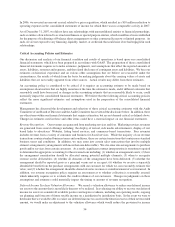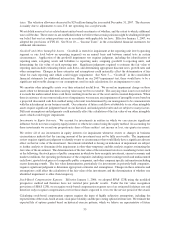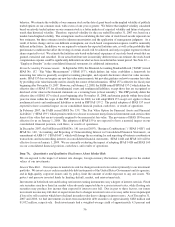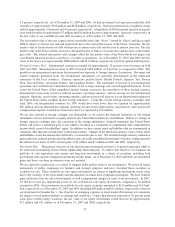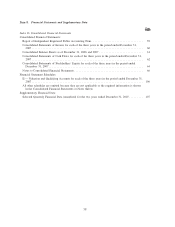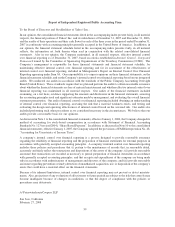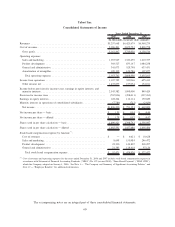Yahoo 2007 Annual Report Download - page 52
Download and view the complete annual report
Please find page 52 of the 2007 Yahoo annual report below. You can navigate through the pages in the report by either clicking on the pages listed below, or by using the keyword search tool below to find specific information within the annual report.totaling $2,363 million, compared to $3,537 million as of December 31, 2006. During the year ended December 31,
2007, we invested $1,586 million in direct stock repurchases (of which $2 million related to restricted stock awards
net share settlement) and $250 million in structured stock repurchases. Additionally, we invested net $602 million,
in capital expenditures and a net $974 million in acquisitions. The cash used for these investments was offset by
$1,919 million of cash generated from operating activities, and $375 million from the issuance of common stock as
a result of the exercise of employee stock options. In 2007, $35 million of excess tax benefits from stock-based
awards were included as a source of cash flows from financing activities. In 2006, excess tax benefits from stock-
based awards of $597 million were included as a source of cash flows from financing activities.
As of December 31, 2007, approximately $1.0 billion of earnings held by our foreign subsidiaries and a corporate
joint venture are designated as indefinitely reinvested outside the United States. If these funds were required for our
operations in the United States, we would be required to accrue and pay additional taxes to repatriate these funds.
Currently, we do not anticipate a need to repatriate these funds to our United States operations.
We invest excess cash predominantly in marketable debt securities that are liquid, of high-quality investment grade,
and the majority of which have effective maturities of less than two years. Our marketable debt and equity securities
are classified as available-for-sale and are reported at fair value, with unrealized gains and losses, net of tax,
recorded in accumulated other comprehensive income (loss). Realized gains or losses and declines in value judged
to be other than temporary, if any, on available-for-sale securities are reported in other income, net. The fair value
for securities is determined based on quoted market prices as of the valuation date. We also invest excess cash to
support our growing infrastructure needs and expand our operations, as consideration for acquisitions and strategic
investments, to repurchase shares of our stock, and in other transactions. As of December 31, 2007, certain of our
marketable debt securities had a fair value below cost (representing less than $2 million) due to the changes in
market rates of interest and yields on these securities. We evaluate these investments periodically for possible other-
than-temporary impairment and review factors such as the length of time and extent to which fair value has been
below cost basis, the financial condition of the issuer, and our ability and intent to hold the investment for a period of
time which may be sufficient for an anticipated recovery in market value. We have the intent and ability to hold
these securities for a reasonable period of time sufficient for a forecasted recovery of fair value up to (or beyond) the
initial cost of the investment and expect to realize the full value of all of these investments upon maturity or sale.
We expect to continue to generate positive cash flow from operations in 2008. We use cash generated by operations
as our primary source of liquidity because we believe that internally generated cash flows are sufficient to support
our business operations and capital expenditures. We believe that existing cash, cash equivalents, and investments
in marketable debt securities, together with any cash generated from operations will be sufficient to meet normal
operating requirements including capital expenditures for the next twelve months. However, we may sell additional
equity, or debt securities, or obtain credit facilities to further enhance our liquidity position, and the sale of
additional equity securities could result in dilution to our stockholders.
In April 2003, we issued $750 million of zero coupon senior convertible notes (the “Notes”) which mature on
April 1, 2008. These Notes are convertible into Yahoo! common stock at a conversion price of $20.50 per share,
subject to adjustment upon the occurrence of certain events. Each $1,000 principal amount of the Notes is
convertible on or prior to April 1, 2008 if the market price of our common stock reaches a specified threshold
($22.55) for a defined period of time or specified corporate transactions occur. As of January 1, 2008, the specified
price threshold had been met and the Notes are convertible at any time through March 31, 2008. The Notes may be
convertible on April 1, 2008 depending on whether the specified price threshold is met for the applicable periods or
a specified corporate transaction occurs prior to April 1, 2008. We will be required to pay the outstanding principal
amount of any Notes not converted by the holders on or before April 1, 2008 in cash. Consequently, the Notes have
been classified as short-term debt in the consolidated balance sheet as of December 31, 2007. Although we have
sufficient available funds to pay the Notes, in the event the Notes are not converted on or before their maturity date,
we may seek financing to fund the repayment of the Notes, as well as to fund other strategic initiatives.
Cash flow changes
Cash provided by operating activities is driven by our net income, adjusted for non-cash items, and non-operating
gains and losses from sales of investments. Non-cash adjustments include depreciation, amortization of intangible
50


